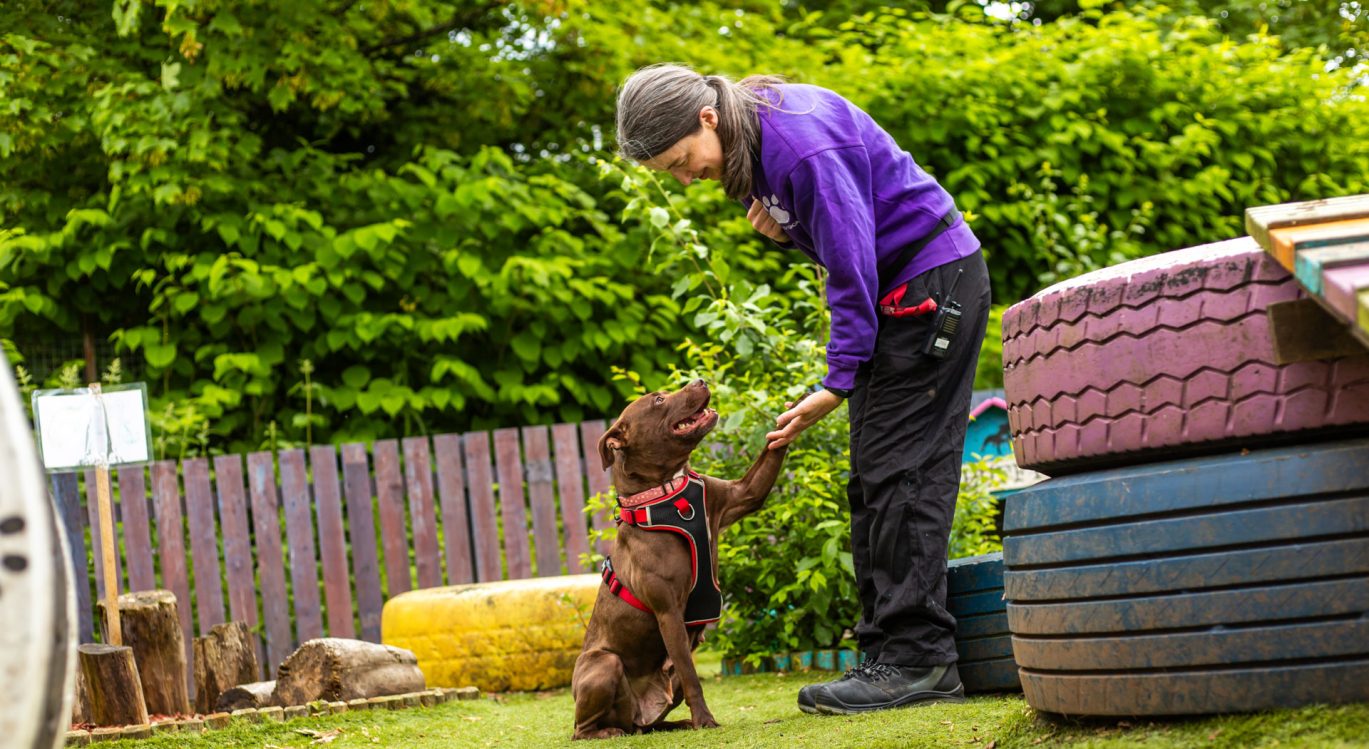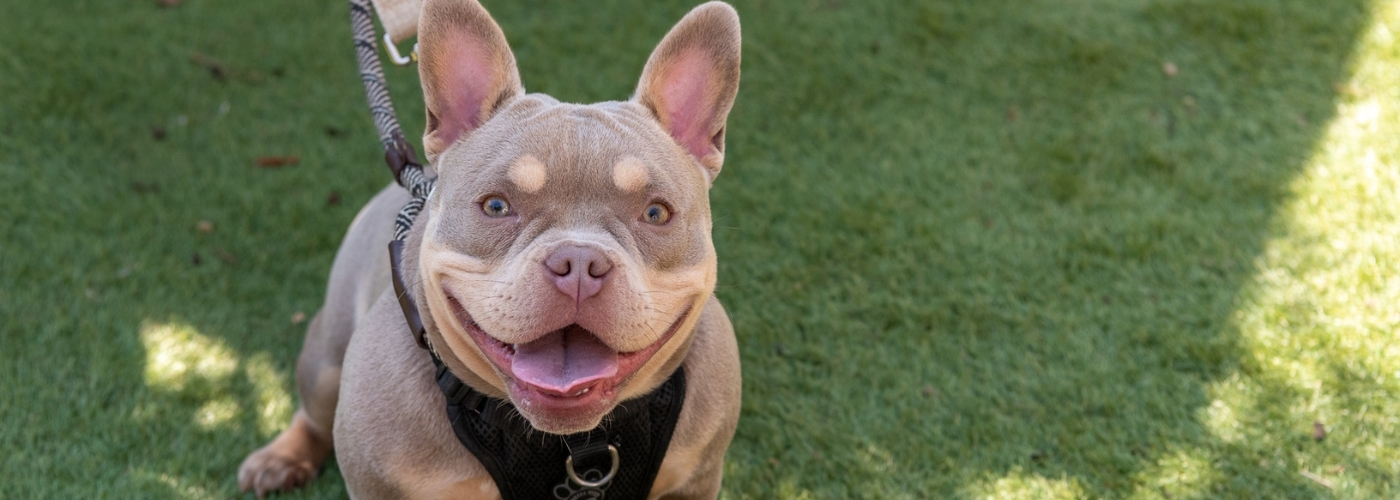
Dogs
There are hundreds of different dog breeds out there, and they all have unique needs. Scroll down to read our dog advice.
If you are interested in adopting, or buying a dog, please ensure you do your homework to establish which breed would be best suited to you and your lifestyle. If you’ve never had a dog before, speak to local vets, trainers and other animal experts. For any concerns about introducing a dog to your home, consult an accredited behaviourist.
Thousands of dogs of all shapes and sizes come through our doors each year. Our teams work hard to match dogs with people or families that would best suit their temperament, lifestyle and welfare needs. We strongly encourage you to consider adopting a dog from one of our Centres.
When adopting a dog or puppy from one of our Centres, neutering and microchipping are included in the adoption fee. We always encourage owners to insure their pets and you’ll receive four weeks of free insurance from PetPlan when you adopt a dog from the Scottish SPCA.
Read through the pages about:
Getting a dog
Dog health care
Dog veterinary care
More information about adopting a dog visit:
Pre-adoption advice
Care guide
Post-adoption & settling in advice
Introducing your dogs
Introducing your dogs and cats
For further information on the health of your animal, please view our Factsheets.
Costs
The cost of owning a dog can vary widely depending on factors such as breed, size, age and lifestyle.
When thinking about getting a dog, it’s important to know the expenses involved. Not only will you have to pay for the dog and all the essentials they require but you’ll also need to budget for the monthly expenses too, including insurance and flea, worm and tick treatments. It’s estimated that dog owners typically spend around £2,000 each year caring for their dog. You’ll also have to consider the veterinary costs involved in keeping your dog safe and healthy, such as neutering, microchipping and any other medical treatment they may need.
Before making the decision to get a dog, it’s also important to understand how to meet their welfare needs and the time that goes into caring for a canine companion. Dogs need a great deal of physical activity and mental stimulation to keep them happy and healthy so owners must be willing and able to provide suitable training and socialisation.
Living Environment
Another thing to consider is whether your home and surroundings are suitable for the type of dog you’re interested in. All dogs are different. Some dogs need more space in the home than others, and some will be able to jump over fences whilst others can squeeze through small gaps. Therefore, it’s important to consider an individual dog’s characteristics such as what they enjoy doing, their exercise needs and their life experience.
Nearby greenspace is hugely beneficial to dogs so they can go out to the toilet and get plenty of exercise. Dogs can be excellent escape artists; whilst some can bound over fences, others can wriggle underneath in search of adventure. Therefore, depending on your new dog, you may need to check, install or reinforce fences and gates to keep your dog safe.
If you have children living in or visiting your home, please remember to never leave babies or small children alone with any dog, regardless of size or breed. Dogs are sentient beings who experience emotions. Children can behave erratically around dogs which, without supervision, can lead to issues even if your dog appears comfortable. Furthermore, children and babies are not able to pick up on signs that the dog may be in some discomfort or would like space. Even excitable and sociable dogs can accidentally cause injury, as well as dogs who might be anxious in some situations.
Other Pets
Contrary to popular belief, it is possible for dogs to live harmoniously with cats. Dogs are highly social animals and some are able to live with other dogs.
When adopting dogs to households with existing pets, we would carefully consider the individual characteristics, preferences and past experiences of the animals involved.
When introducing a new dog to other pets, it’s important to do so gradually and to have a plan should the introductions prove unsuccessful. If you already have a dog and are thinking about getting a new puppy or another dog, ask the breeder or rescue centre if you can arrange an introduction before committing. This will allow you to see how they get on with one another and can help to avoid behavioural problems in the future.
You have to be prepared to persevere or make adaptations to accommodate both pets. Sometimes, even with careful matching and introductions, you may still experience issues when introducing your animals. Not only can this be very stressful for you, but it can also be distressing for your animals. If this happens, contact an accredited behaviourist as soon as possible.
Responsibility
Getting a dog can be a life-changing experience but it’s also a big responsibility. The average lifespan of a dog is ten to thirteen years so you need to be committed to providing for them long term. It’s also wise to have a plan, should your dog outlive you. Our free Forever Care service gives owners peace of mind that we will take your pet into our care if you pass away or can no longer care for them.
Dogs need human companionship therefore we advise against leaving dogs at home alone for long periods of time. If you are often out all day, this means you may need a support system, such as friends, family, a dog walker or neighbour who can help tend to your dogs. The amount of time dogs can spend on their own will depend on their genetics, early life experiences, individual characteristics and their life stage, for example, dogs who suffer from separation anxiety and puppies will only be able to spend short periods of time alone.
Many restaurants and hotels are now dog-friendly but if your dog finds travelling and busy settings stressful, or you cannot take your dog on holiday with you, you’ll need a plan. If you don’t have a friend or family member who can take care of your dog whilst you’re away, you’ll need to look into reliable pet sitting services or boarding facilities in your area.
Where should you get a dog from?
On average, 153 dogs come into our kennels every month, so your new best friend could be waiting to be adopted from one of our Centres. We have dogs of all sizes, temperaments and personalities so we can help you find your perfect pooch. Remember to keep checking the website as we have new dogs ready for adoption daily.
Every dog adopted from the Scottish SPCA will have been fully vet checked, neutered (subject to age and veterinary advice) or a voucher issued, treated against fleas and worms, microchipped, and vaccinated. We also include free pet insurance for four weeks. Owners have the option to extend this into lifelong cover, which many insurers do not offer.
We may not always have puppies available due to high demand and we understand that you may be looking for a specific breed that we might not have at our Centres. However, we believe that rescue dogs make great pets regardless of breed or age so it’s worth keeping an open mind. Our Centres can arrange meetings with the dog you’re interested in adopting so you can get an idea of how they’d fit into your family.
If adoption isn’t an option for you, please take your time to find a responsible breeder. A reputable breeder will be able to provide paperwork on the puppy’s veterinary history and tell you about the level of interaction the pup has had with people and other animals.
Low-welfare puppy dealers can go to great lengths to convince buyers that they are reputable.

Support us from £5 a month
It costs us £63,000 every day to continue the work that animals across Scotland depend on. Our work is only possible because of the generosity of people like you.





